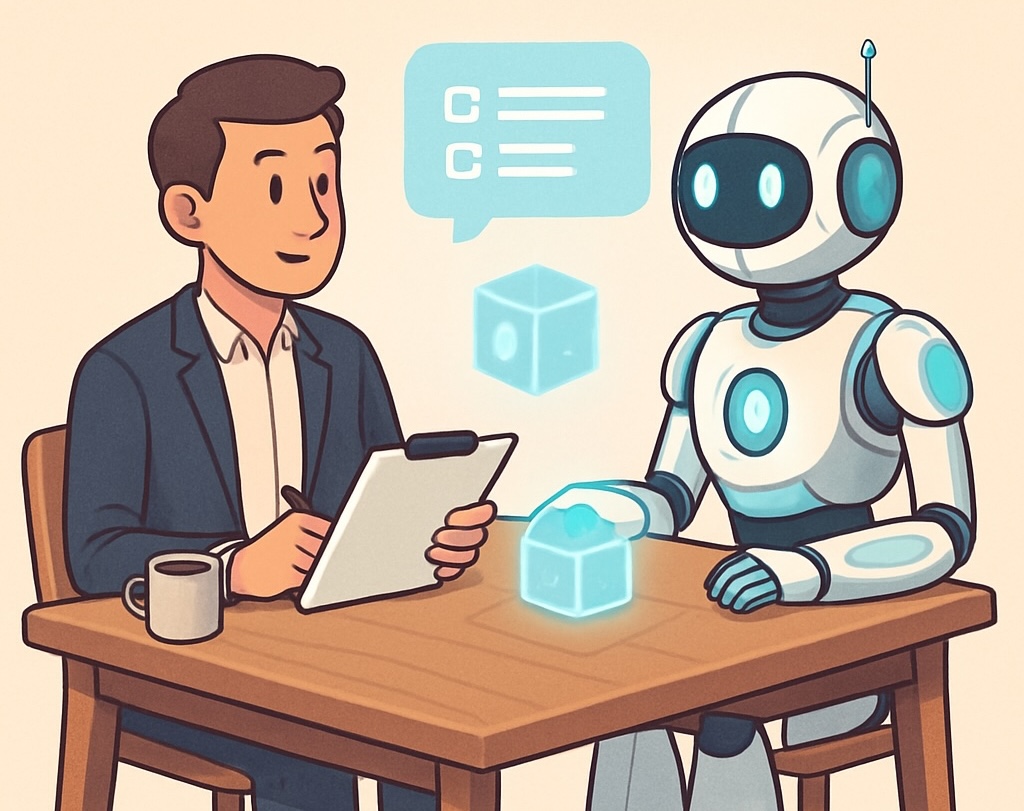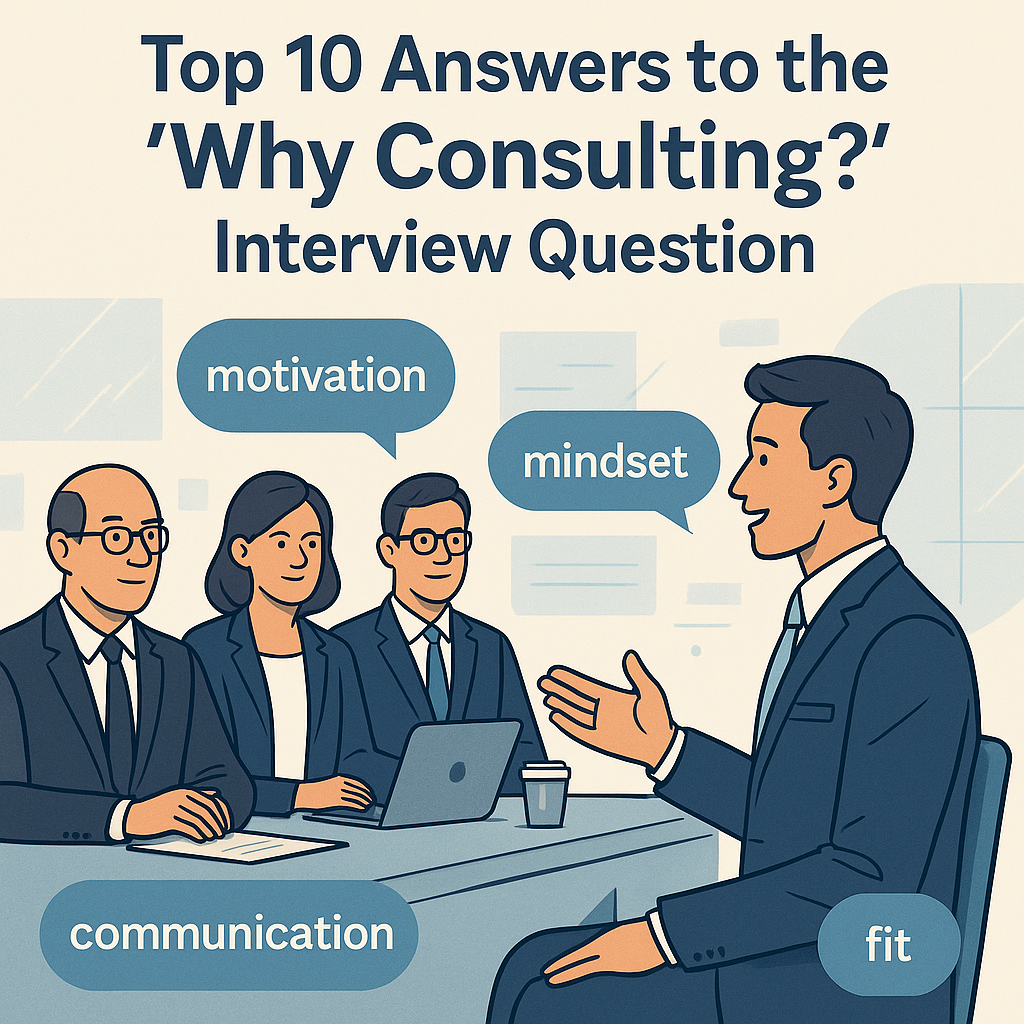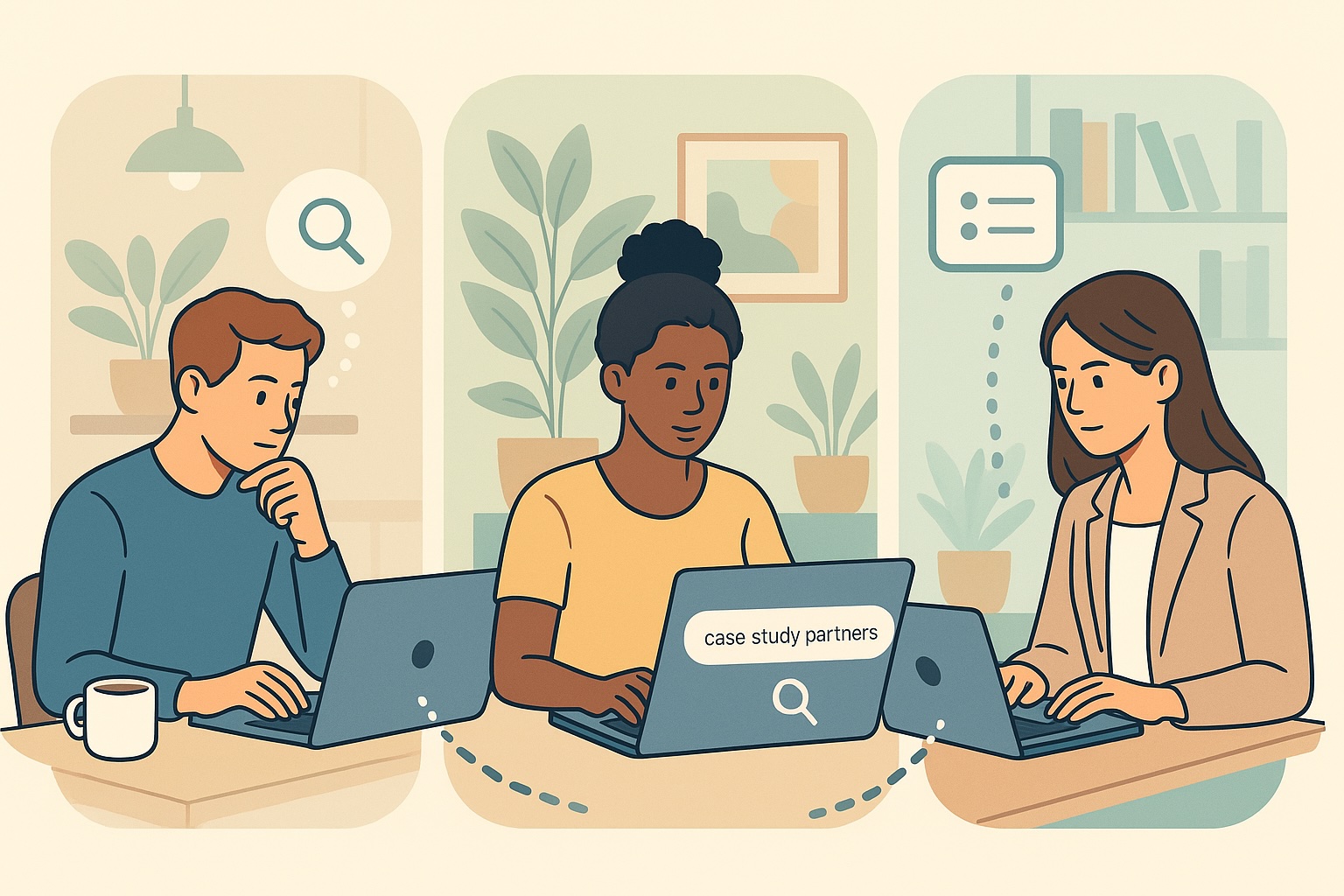
What Are Consulting Case Interviews? (2025 Guide)
Case interviews are frequently used by many top management consulting firms to evaluate potential candidates. But what exactly is a case interview, and what makes it different from traditional job interviews? This article will explain the fundamentals of case interviews, their purpose, and why they're such a crucial part of the consulting recruitment process.
What is a Case Interview?
A case interview presents candidates with a realistic business scenario or problem to analyze and solve in real-time. Unlike traditional interviews, which focus on past experiences, case interviews evaluate how candidates approach unfamiliar problems. The typical stages include:
- Problem Presentation: The interviewer describes a business challenge.
- Clarification: Candidates ask questions to understand the problem clearly.
- Structuring: Candidates create a framework to address the issue.
- Data Gathering & Analysis: Candidates request information and interpret data.
- Synthesis: Candidates summarize their findings and insights.
- Recommendation: Candidates provide a solution and explain their reasoning.
The primary aim is to simulate a real consulting scenario, assessing candidates' ability to handle actual consulting work.
Example Question of a Case Interview
"The CEO of Deutsche Bank is concerned about declining profitability over the past three years. Determine the factors behind this decline and suggest strategies to reverse the trend."
Candidates would then:
- Structure the problem.
- Investigate revenue and cost drivers.
- Analyze and identify causes.
- Recommend strategic actions.
Why Companies Use Case Interviews
Originally used by consulting firms, case interviews are now prevalent across industries for these reasons:
- Realistic Simulation: Reflect actual consulting engagements.
- Analytical Testing: Evaluate candidates' analytical skills.
- Communication Skills: Measure clarity in presenting ideas.
- Business Acumen: Assess understanding of business concepts.
- Client Interaction: Determine candidates' readiness to engage with clients.
Structure and Core Elements
A typical case interview lasts 30-40 minutes and includes:
- Introduction (5 mins): Brief introduction and small talk.
- Personal Fit (10-15 mins): Background and motivation discussion.
- Case Presentation (20-30 mins): Main business problem.
- Candidate Q&A (5 mins): Candidate's questions to the interviewer.
The case presentation is central, assessing how candidates approach complex problems.
Skills Assessed
Case interviews test the following core skills:
- Problem Structuring: Breaking down complex issues clearly.
- Logical Reasoning: Showing a structured thought process.
- Analytical Ability: Systematic data interpretation.
- Evidence-Based Conclusions: Using data to support recommendations.
- Synthesis: Clearly presenting insights and solutions.
Notably, case interviews do not have one "correct" answer. The evaluation focuses on your thought process and rationale.
Types of Case Interview Formats
Case interviews vary by format:
- Interviewer-Led: Common at McKinsey. The interviewer guides the candidate step-by-step through the case.
- Candidate-Led: Typical at BCG and Bain. Candidates structure and navigate the case themselves, directing the interaction.
- Written Cases: Candidates analyze written data and may need to produce written recommendations or presentations.
- Group Cases: Multiple candidates collaboratively solve a problem.
- Presentation Cases: Candidates formally present their solutions.
Common Case Interview Categories
Case interviews are often organised around recurring business challenges. Each category reflects a real-world scenario consultants frequently encounter:
- Profitability: "Why are our profits declining?"
- Growth Strategy: "How can we increase our revenue?"
- Market Entry: "Should we enter a new market?"
- Mergers & Acquisitions: "Should we acquire a competitor?"
- Pricing: "Should we revise our pricing strategy?"
- Competitive Response: "How should we respond to a new market entrant?"
- Digital Transformation: "Is a proposed technology investment strategically and financially sound?"
These categories provide the thematic context of a case. However, within any case, you'll face a variety of question types.
Case Interview Question Types
While the category defines what the case is about, the question types determine how you're expected to engage with the problem. Most cases include multiple types in sequence, each assessing a distinct consulting skill:
- Structuring: Break down complex problems and create a clear, logical framework.
- Example: "What factors should we consider before investing in AI-powered customer service?"
- Numeracy / Quantitative Analysis: Interpret data, perform calculations, and assess financial viability.
- Example: "Calculate the break-even point using cost and savings projections."
- Judgement & Insights: Interpret qualitative trends and assess strategic implications.
- Example: "How might customer expectations evolve after a digital transformation?"
- Creativity / Brainstorming: Generate innovative ideas and explore new opportunities.
- Example: "What additional features could improve the customer service platform?"
- Synthesis: Summarise key findings and deliver a structured, persuasive recommendation.
- Example: "Should the company proceed with the investment? Why or why not?"
Case Interviews vs. Traditional Interviews
| Case Interviews | Traditional Interviews |
|---|---|
| Assess real-time problem-solving | Focus on past experiences |
| Evaluate analytical and structured thinking | Evaluate qualifications and resume |
| Simulate client-facing scenarios | Discuss career achievements |
| Require practical business understanding | Assess cultural fit |
Who Uses Case Interviews?
Case interviews are standard in consulting (McKinsey, BCG, Bain) and are also adopted by:
- Fortune 500 strategy departments
- Tech companies (strategic roles)
- Financial services (analytical roles)
- Marketing and product management
Conclusion
Case interviews are a unique interview format designed to evaluate how candidates think through and solve complex business problems. By simulating the types of challenges consultants face with clients, they help companies assess analytical abilities, structured thinking, and communication skills.
Taking Your Practice to the Next Level
To prepare for case interviews, serious candidates often face common obstacles:
- Scheduling conflicts make consistent practice with partners difficult
- Quality feedback is hard to obtain, especially from peers with similar experience levels
- Last-minute cancellations disrupt preparation momentum
- Limited opportunities to practice speaking through cases naturally
This is where PrepPartner.ai is transforming case interview preparation. This AI-powered platform offers significant advantages:
- On-demand practice: Access realistic case interviews 24/7 without scheduling hassles
- Natural voice interaction: Speak through cases as you would in a real interview - no typing, just turn your camera and mic on
- Personalized feedback: Receive detailed, objective analysis after every session
- Affordable access: Premium preparation for less than £10 per week
Many successful candidates now combine traditional preparation methods with AI-powered practice to maximize their interview readiness. The ability to rapidly iterate through cases, receive immediate feedback, and practice at your convenience provides a significant competitive advantage in an increasingly demanding recruitment process.
Whether your interview is months away or just days from now, incorporating tools like PrepPartner.ai into your preparation strategy can help you develop the confidence, structure, and communication skills that top consulting firms demand.
FAQs
Q: What's the main purpose of a case interview?
A: To evaluate candidates' problem-solving and analytical thinking in realistic business scenarios.
Q: Are case interviews only used by consulting firms?
A: No, they're common in strategy, technology, financial services, and marketing roles.
Q: What's the difference between interviewer-led and candidate-led cases?
A: Interviewer-led cases are structured by the interviewer, whereas candidate-led cases rely on candidates to structure and lead the discussion.
Q: Do I need the correct answer to pass a case interview?
A: No, evaluation emphasizes your analytical process and logical reasoning, not a single correct answer.
Q: Do I need a business background for case interviews?
A: Not necessarily. Structured thinking and analytical skills are most important and can come from diverse backgrounds.
 PrepPartner TeamPrepPartnerTop 10 Answers to the 'Why Consulting?' Interview QuestionThe 'Why Consulting?' question is a make-or-break moment in your consulting interview. We share 10 strong example answers that show genuine motivation, personal fit, and an understanding of what consulting really is.Read More
PrepPartner TeamPrepPartnerTop 10 Answers to the 'Why Consulting?' Interview QuestionThe 'Why Consulting?' question is a make-or-break moment in your consulting interview. We share 10 strong example answers that show genuine motivation, personal fit, and an understanding of what consulting really is.Read More PrepPartner TeamPrepPartnerWill Consulting Jobs Be Replaced by AI? What changes, what doesn’t, and how to prepareAn evidence-based look at how AI is transforming consulting. We explore which roles and tasks are most exposed to automation, what new skills will matter, and how consultants can adapt to thrive.Read More
PrepPartner TeamPrepPartnerWill Consulting Jobs Be Replaced by AI? What changes, what doesn’t, and how to prepareAn evidence-based look at how AI is transforming consulting. We explore which roles and tasks are most exposed to automation, what new skills will matter, and how consultants can adapt to thrive.Read More PrepPartner TeamPrepPartnerHow to Find Case Interview Partners (and Smart Alternatives)Discover the most effective ways to find case interview partners for consulting prep, including online platforms, communities, AI tools, and professional coaching options.Read More
PrepPartner TeamPrepPartnerHow to Find Case Interview Partners (and Smart Alternatives)Discover the most effective ways to find case interview partners for consulting prep, including online platforms, communities, AI tools, and professional coaching options.Read More